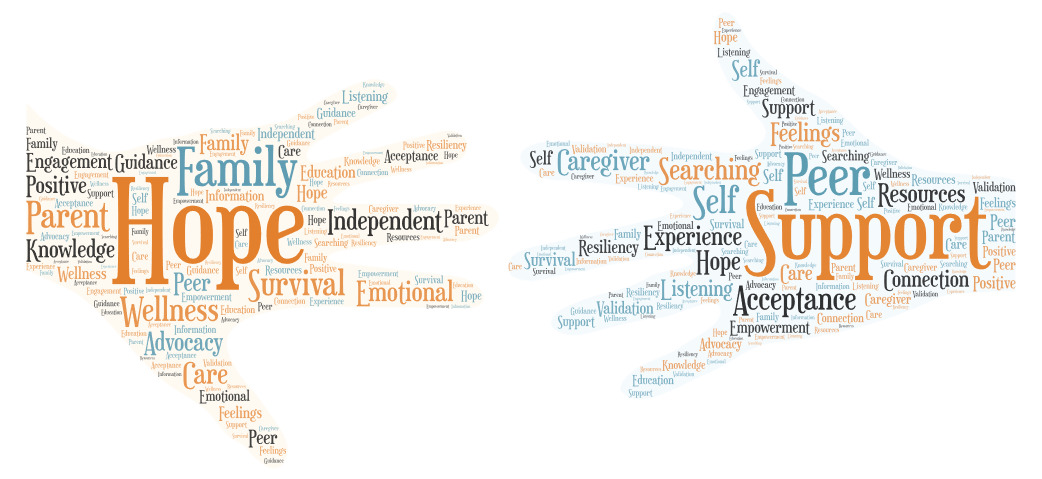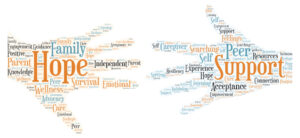
by Erin Faulkner, Family Peer Supporter
August 15, 2023
For this month’s topic, “Parenting in Recovery”, I once again had to turn to my internet friend, Google. There are many kinds of recovery. Recovery from substance abuse or other addictions. Recovery from acute mental health events. Recovery from physical injuries. What does recovery mean for me? Google defines recovery as “a return to a normal state of health, mind, or strength” and “the action or process of regaining possession or control of something stolen or lost.” That last word, lost, is what I connected with. For many parents of children with special health care needs or behavioral health challenges, the expectation of what we envisioned for our lives and for our children is gone or changed, in a sense – lost.
My story is a little different than many families as I knew that the probability of my daughter have Stickler Syndrome was 50% because I have it, too. So more than “lost," I often feel guilt. Should I have done this, brought a child into this world that would have some suffering?
 Last week, I participated in a training by Brad Thompson, a clinical counselor, with years of experience in family peer support. I learned about Stages of Adapting: Survival, Searching, Settled In, and Separating. These stages can be a framework for our journey to recovery as parents of children with special needs.
Last week, I participated in a training by Brad Thompson, a clinical counselor, with years of experience in family peer support. I learned about Stages of Adapting: Survival, Searching, Settled In, and Separating. These stages can be a framework for our journey to recovery as parents of children with special needs.
In Survival, we may experience denial, anxiety or fear. This is the part where our expectations and reality have gone in different directions. These feelings stem from wondering if we are able to handle what has been handed to us and whether we have it in us to fight. In addition to my daughter’s connective tissue disorder, she was also diagnosed at 5 years old with an Inflammatory Myofibroblastic Tumor on her bladder. I can honestly say this was the scariest time of my life. We didn’t know if she had cancer for almost a week. For this, I was in “survival mode”. I was scared for her, anxious about work and money. A lot of emotions and thoughts went through me, many that those there to support me could not understand. This anxiety pops up whenever she has some kind of an illness or physical problem. Most people might blow it off and not be worried, but her “UTI” turned out to be so much more that it affects me to this day.
We often Search for answers. Is it my fault, the doctor’s, God’s? What will other people think? Why me? This stage includes feeling such as guilt, shame, depression, anger. This is the stage that will pop up from time to time, but less often as the years go by. Usually, it pops up because of something she is experiencing: pain, sadness, questioning. Oftentimes, it is her that tells me not to feel guilty or sad.
We finally move to acceptance and hope. We have “Settled In” to our lives with new expectations and realities. For me this is when action happens. This is what I need to do to make sure that she gets everything she needs and can perform to her potential. But acceptance is more than just about accepting what your child’s future is. It is also accepting what your future will be. A few months ago, in my blog, I talked about 3 questions I had learned from a Ted Talk. I bring those up frequently with people because I think they can be arranged and fit most any situation.
- What does great look like?
- What is your new expectation? Be realistic but have hope.
- What do I know for sure?
- Avoid travelling down the rabbit hole of “what ifs” or looking at the glass as half empty rather than just needing to be topped off
- What can I do to help?
- What can you do to help your child in school, home, etc?
- What can you do to take care of yourself? Don’t forget about you!
In doing this, we will then move into Separating. You and your child are not one person. You can’t care for yourself if you are only caring for your child. This is where you become independent of one another. My daughter is now 21 and in college. I keep trying to hold on to her for as long and as much as possible. She is very clearly telling me, “I love you mom, but back off!” This has been happening for years, but now she is physically gone, so it is very real. I have had to really discover who I am without her. This is not special to parents of children with special needs, but I do believe that it is different.
As a parent of a child with special health care needs, I continue to process through these stages. You may not reach the last stage and “graduate” and move on. You slide back to a previous stage because something else has happened in their life or your life. That is okay! Process those feelings and keep moving forward.

